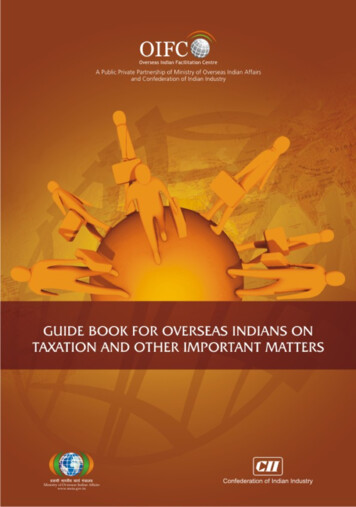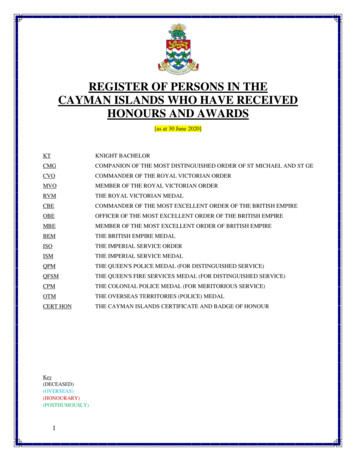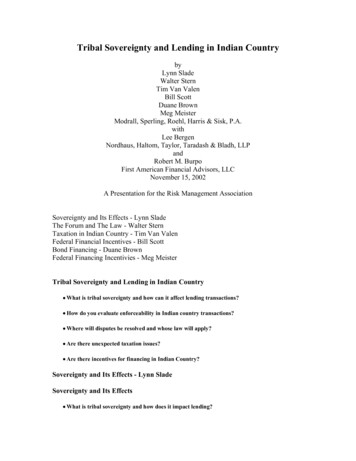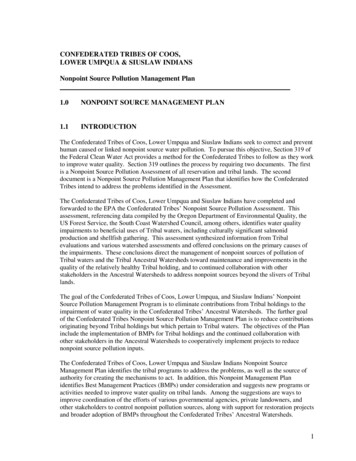
Transcription
Guide Book for Overseas IndiansonTaxation and Other Important Matters
Price: 500.00 (INR)DISCLAIMERThis Guide Book has been compiled/summarised from information available in official documents/circulars/websites of the Govt. of India, RBI and other reliable sources. Every possible care has beentaken to provide current and authentic information. This Guide Book for Overseas Indians is intendedto serve as a guide to them and does not purport to be a legal document. In case of any variation between what has been stated in this Guide Book and the relevant Act, Rules, Regulations, Policy Statements etc., the latter shall prevail.
Overseas Indian Facilitation CentreThe Indian Diaspora is the largest in the world to day after China and has roots in every countryin the globe. The Diaspora contribution to their state of origin has been made in various ways,through remittances, foreign direct investment (FDI), transfer of knowledge and entrepreneurialnetworks.In order to expand the entrepreneurial ties and engage them as partners in India’s progress, anOverseas Indian Facilitation Centre, a not for profit public private initiative of Ministry of OverseasIndian Affairs (MOIA) and Confederation of Indian Industry (CII), was launched on 28th May2007.With a strong intention to facilitate and bridge the gap between the Overseas Indians and India,OIFC has a mandate to cover broad areas: investment facilitation, knowledge networking andensuring business-to-business partnerships in focus sectors like real estate, wealth management,taxation, legal, healthcare, education and infrastructure.The key objectives of OIFC are: Promote overseas Indian investment into India and facilitate business partnership by givingauthentic & real time informationEstablish and maintain a Diaspora Knowledge Network by creating a database of OverseasIndiansFunction as a clearing house for all investment related informationAssist States to project and promote investment opportunities to overseas Indians in keyfocus sectors.In line with the above objectives, OIFC provides the following services: To appraise the Indian Diaspora with the up-to-date investment opportunities existing inIndia provide hand-holding services via its knowledge partners To provide customized services in the form of finding sector and state specific investmentprojects, preparing feasibility reports and organizing and assisting in overseas road shows toattract FDI To assist in effective business-to-business partnerships To maintain a strong Diaspora Knowledge Network To provide consular services in the long run
CONTENTSPART - I : TAXATION1. Residential Status for Tax Purposes92. Special Provisions Relating to Certain Income of NRIs183. Tax Exemptions from Income Tax, Wealth Tax and Gift Tax204. Presumptive Tax Provisions235. Tax Incentives for Industries256. Authority for Advance Rulings277. Transfer Pricing318. Double Tax Avoidance Agreements38PART-II : OTHER IMPORTANT MATTERS & OVERSEAS INDIANS9. Overseas Citizenship of India (OCI)4110. PIO Card5311. Foreign Contribution Regulation Act, 19765612. Special Economic Zones7013. List of Important Websites7514. Contact Details77
PART - ITAXATION
1RESIDENTIAL STATUS FORTAX PURPOSESIn India, as in many other countries, the chargeof income tax and the scope of taxable incomevaries with the factor of residence. Thereare two categories of taxable entities viz. (1)residents and (2) non-residents. Residents arefurther classified into two sub-categories (i)resident and ordinarily resident and (ii) residentbut not ordinarily resident. The law prescribestwo alternative technical tests of residence forindividual taxpayers. Each of the two testsrelate to the physical presence of the taxpayerin India in the course of the “previous year”which would be the twelve months from April1 to March 31.A person is said to be “resident” in India in anyprevious year if he(a) is in India in that year for an aggregateperiod of 182 days or more; or(b) having within the four years precedingthat year been in India for a period of365 days or more, is in India in that yearfor an aggregate period of 60 days ormore.The above provisions are applicable to allindividuals irrespective of their nationality.However, as a special concession for Indiancitizens and foreign citizens of Indian origin,the period of 60 days referred to in Clause(b) above, will be extended to 182 days intwo cases: (i) where an Indian citizenleaves India in any year for employmentoutside India; and (ii) where an Indiancitizen or a foreign citizen of Indianorigin (NRI), who is outside India,comes on a visit to India.In the above context, an individual visiting Indiaseveral times during the relevant “previousyear” should note that judicial authorities inIndia have held that both the days of entry andexit are counted while calculating the numberof days stay in India, irrespective of howevershort the time spent in India on those two daysmay be.A “non-resident” is merely defined as a personwho is not a “resident” i.e. one who does notsatisfy either of the two prescribed tests ofresidence.An individual, who is defined as Resident in agiven financial year is said to be “not ordinarilyresident” in any previous year if he has been anon-resident in India 9 out of the 10 precedingprevious years or he has during the 7 precedingprevious years been in India for a period of, orperiods amounting in all to, 729 days or less.Till 31st March 2003, “not ordinarily resident”was defined as a person who has not been residentin India in 9 out of 10 preceding previous yearsor he has not during the 7 preceding previousyears been in India for a period of, or periodsamounting in all to, 730 days or more.Section 6 of the Income-tax Act, 1961, prescribesthe tests for determining the residential statusof a person. Section 6, as amended, reads asfollows:For the purposes of this Act,(1) An individual is said to be resident inIndia in any previous year, if he-9
Guide Book for Overseas Indians on Taxation and Other Important Mattersa) is in India in that year for a periodor periods amounting in all to onehundred and eighty-two days ormore; orb) [* * *]c) having within the four yearspreceding that year been in Indiafor a period or periods amountingin all to three hundred and sixty fivedays or more, is in India for a periodor periods amounting in all to sixtydays or more in that year.Explanation.- In the case of an individual,(a) being a citizen of India, who leavesIndia in any previous year [as amember of the crew of an Indianship as defined in clause (18) ofsection 3 of the Merchant ShippingAct, 1958 (44 of 1958), or] for thepurpose of employment outsideIndia, the provisions of sub-clause(c) shall apply in relation to thatyear as if for the words “sixty days”,occurring therein, the words “onehundred and eighty-two days” hadbeen substituted(b) being a citizen of India, or a personof Indian origin within the meaningof Explanation to clause (e) ofsection 115C, who, being outsideIndia, comes on a visit to India inany previous year, the provisions ofsub-clause(c) shall apply in relation to that yearas if for the words “sixty days”,occurring therein, the words “onehundred and eighty-two days” hadbeen substituted.(2) A Hindu undivided family, firm orother association of persons is said tobe resident in India in any previous yearin every case except where during that10(3)(4)(5)(6)year the control and management of itsaffairs is situated wholly outside India.A company is said to be resident in Indiain any previous year, if(a) it is an Indian company; or(b) during that year, the control andmanagement of its affairs is situatedwholly in India.Every other person is said to be residentin India in any previous year in everycase, except where during that year thecontrol and management of his affairsis situated wholly outside India.If a person is resident in India in aprevious year relevant to an assessmentyear in respect of any source of income,he shall be deemed to be resident inIndia in the previous year relevant to theassessment year in respect of each ofhis other sources of income.A person is said to be “not ordinarilyresident” in India in any previous year ifsuch person is(a) an individual who has not been anon-resident in India in nine outof the ten previous years precedingthat year, or has not during theseven previous years preceding thatyear been in India for a period of,or periods amounting in all to, sevenhundred and twenty-nine days orless; or(b) a Hindu undivided family whose
Residential Status for Tax Purposes11
Guide Book for Overseas Indians on Taxation and Other Important Matters12
Residential Status for Tax Purposesmanager has not been non-residentin India in nine out ofthe tenprevious years preceding that year,or has not during the seven previousyears preceding that year been inIndia for a period of, or periodsamounting in all to, seven hundredand twenty-nine days or less.An analysis of the above provisions wouldindicate that 1. To become a non-resident forincome- tax purposes, an Indian citizenleaving India for the first time to take upemployment abroad should be out ofthe country latest by 28th Septemberand should not return to India before1st April of the next year. However, incase of a person leaving India for takingup a business or profession, the criteriaof 60 days will apply, as defined earlier.2. An NRI individual, whose total stayin India in 4 preceding years exceeds364 days, will not lose his non-residentstatus in the following year(s) if his totalstay in India in that year (from April 1 toMarch 31) does not exceed(a) 181 days, if he is on a “visit” toIndia; or(b) 59 days, if he comes to India on“transfer of residence”.3. An NRI who has returned to India forsettlement, whose total stay in India for4 preceding years does not exceed 364days will not lose his non-resident statusin the following year(s) if his total stayin India in such year(s) (from April 1 toMarch 31) does not exceed 181 days.4. A new-comer to India would be treatedas “not ordinarily resident” for the firsttwo years of his stay in India or if treatedas Non Resident in the year of arrivalthen for the second and third year ofhis stay in India. An individual (whetherIndian or foreign citizen) who has leftIndia and remains non-resident for atleast nine years preceding his return toIndia or whose stay in 7 years precedingthe year of return has not exceeded 729days would, upon his return, be treatedas “non-resident” or “not ordinarilyresident” depending upon the numberof days stay in India in the year ofreturn. The status of “not ordinarilyresident” will remain effective for 2years including or following the year ofreturn as the case may be.Important Points to be Borne in Mindwhile Determining the ResidentialStatus of an Individual(a) Residential status is always determinedfor the Previous Year because theassessee has to determine the totalincome of the Previous Year only. Inother words, as the tax is on the incomeof a particular Previous Year, the enquiryand determination of the residencequalification must confine to the factsobtaining in that Previous Year.(b) If a person is resident in India in aPrevious Year in respect of any sourceof income, he shall be deemed to beresident in India in the Previous Yearrelevant to the Assessment Year inrespect of each of his other sources ofIncome. [Section 6(5)](c) Relevant Previous Year means, thePrevious Year for which residentialstatus is to be determined(d) It is not necessary that the stay shouldbe for a continuous period.(e) It is not necessary that the stay should13
Guide Book for Overseas Indians on Taxation and Other Important Mattersbe at one place in India.(f) Both the day of entry and the day ofdeparture should be treated as the dayof stay in India [Petition No.7 of 1995225 ITR 462 (AAR)](g) Presence in territorial waters in Indiawould also be regarded as stay in India.(h) A person is said to be of Indian Originif he or either of his parents or any ofhis grand parents was born in undividedIndia [Section 115C](i) Official tours abroad in connectionwith employment in India shall not beregarded as employment outside India.(j) A person may be resident of more thanone country for any Previous Year.(k) Citizenship of a country and residentialstatus of that country are two separateconcepts. A person may be an Indiannational/Citizen but may not be aresident in India and vice versa.Points to be Considered by NRIs 14Previous Year is period of 12 monthsfrom 1st April to 31st March. Numberof days stay in India is to be countedduring this period.Both the Day of Arrival into India andthe Day of Departure from India arecounted as the days of stay in India (i.e.2 days stay in India).Dates stamped on Passport are normallyconsidered as proof of dates ofdeparture from and arrival in India.It is advisable to keep severalphotocopies of the relevant passportpages for present and future use.Ensure that date stamped on thepassport is legible.Keep track of no. of days in Indiafrom year to year and check the samebefore making the next trip to India. It is advisable to maintain a chart forthe number of days stay in the currentand in the preceding seven (7) previousyears.In the 1st year of leaving India foremployment outside India, ensurethat you leave before 29th September.Otherwise total income of the financialyear (including the foreign income) willbe taxable in India if it exceeds the basicexemption limit.During the last year of stay abroad, ontransfer of residence to India, ensureto come back on or after Feb 1st (orFeb 2nd in case of a leap year). Sincearrival before this date will result in stayin India exceeding 59 days. However, aperson whose stay in India in precedingfour (4) previous years does not exceed365 days, he may return after September30th of the relevant year without loss ofnon-resident status.Implications of Residential Status forNRIs/PIOsThe complexities of determining the residentialstatus for individual NRI/PIO under variousstatutes and regulations will be obvious from theprovisions outlined above and in this context itwould be important to note the following:1 The concepts and rules for determiningthe residential status income-tax lawsand FEMA are quite different and itwould be possible to be a resident underone law and non-resident under theother.2 For exemption of income tax in respectof NRE and FCNR deposits investorshould be non-resident under FEMA.3 The special tax rate concessions onincome and long-term capital gains onspecified assets, purchased in convertible
Residential Status for Tax Purposesforeign exchange are available to nonresidents under the Income-tax Act.CHARGEABLE INCOMESection 5 of the Income-tax Act lays down thescope of total income of any previous year ofany person. The Section reads as follows:(1) Subject to the provisions of this Act,the total income of any previous year ofa person who is a resident includes allincome from whatever source derivedwhich(a) is received or is deemed to bereceived in India in such year by oron behalf of such person ;or(b) accrues or arises or is deemed toaccrue or arise to him in India duringsuch year; or(c) accrues or arises to him outside Indiaduring such year:Provided that, in the case of a personnot ordinarily resident in Indiawithin the meaning of sub-section(6) of Section 6, the income whichaccrues or arises to him outside Indiashall not be so included unless it isderived from a business controlledin or a profession set up in India.(2) Subject to the provisions of this Act,the total income of any previous year ofa person who is a non-resident includesall income from whatever source derivedwhich(a) is received or is deemed to bereceived in India in such year by oron behalf of such person; or(b) accrues or arises or is deemed toaccrue or arise to him in India duringsuch year.Explanation I.-Income accruing or arisingoutside India shall not be deemed to be receivedin India within the meaning of this section byreason only of the fact that it is taken intoaccount in a balance sheet prepared in India.Explanation 2.-For the removal of doubts, itis hereby declared that income which has beenincluded in the total income of a person on thebasis that it has accrued or arisen or is deemedto have accrued or arisen to him shall not againbe so included on the basis that it is received ordeemed to be received by him in India.”Thus, it is clear from the above that the incidenceof tax depends upon a person’s ResidentialStatus and also upon the place and time ofaccrual and receipt of income.As stated earlier, the charge of income tax varieswith the factor of residence in the previous yearand the general position with regard to the threecategories of taxpayers can be summarised asfollows:1. Taxpayers in all categories are chargeableon income, from whatever sourcederived, which is received or is deemedto be received in India by or on behalfof them or which accrues or arises oris deemed to accrue or arise to themin India other than income specified asexempt income.15
Guide Book for Overseas Indians on Taxation and Other Important MattersIn tabular form, the above may be stated as under:Sources of IncomeIndian IncomeIncome received or deemed tobe received in India during thecurrent financial year.Income accruing or arising ordeemed to accrue or arise inIndia during the currentfinancial year.Income accruing or arising ordeemed to accrue or arise outside India, but first receiptis in India during the currentfinancial yearR & ORR & NORNRTaxable in IndiaTaxable in IndiaTaxable in IndiaTaxable in IndiaTaxable in IndiaTaxable in IndiaTaxable in IndiaForeign IncomeIncome accruing or arisingor deemed to accrue or ariseTaxable in Indiaoutside India and recievedoutside India, during the currentfinancial year.Income accruing or arising oroutside India from a Business/profession controlled in/fromTaxable in IndiaIndia during the currentfinancial year.Income accruing or arising outside India from any sourceTaxable in Indiaother than Business Professioncontrolled from IndiaIn the above context, it may be notedthat the ‘receipt’ of income refers to thefirst occasion when the recipient gets themoney under his own control and it isthe first receipt that determines the yearand place of receipt for the purposesof taxation. If the income is alreadyreceived outside India, no tax liabilitywill arise when the whole or any part ofsuch income is remitted to India.16Taxable in IndiaTaxable in IndiaTaxable in IndiaNot Taxable inIndiaTaxable in IndiaNot Taxable inIndiaTaxable in IndiaNot Taxable inIndia.2. A “resident and ordinarily resident” paystax in India on his entire world income,wherever accrued or received.3. A “non-resident” pays tax only on histaxable Indian income and his foreignincome (earned and received outsideIndia) is totally exempt from Indiantaxes.4. A “not ordinarily resident” pays taxon taxable Indian income and on
Residential Status for Tax Purposesforeign income derived from a businesscontrolled in or a profession set up inIndia5. An individual upon acquiring the statusof “not ordinarily resident” would notpay tax, for a period of two years, on theinterest on :a) the continued Foreign CurrencyNon-Resident (FCNR) account;(b) the Resident Foreign Currency(RFC) account; and(c) on income earned from foreignsources unless such income isdirectly received in India or is earnedfrom a business controlled in or aprofession set up in India.17
2SPECIAL PROVISIONS RELATING TOCERTAIN INCOME OF NRIsSome of the special tax concessions for NRIs/PIO investing in India were introduced in theFinance Act, 1983, which became effective onJune 1, 1983. The tax provisions were furtherliberalised by subsequent Finance Acts andother amending laws.Special Concessionscompanies. Accordingly, dividend received bythe shareholders of Indian companies will beexempt from tax. The income received fromunits of Unit Trust of India and of specifiedmutual funds will also be exempt.Finance Act 2004 has:(a) granted tax exemption as regards longterm capital gains arising from transferof equity shares in a company and/or units of equity oriented schemesof Mutual Funds, which are subject tosecurities transaction tax; and(b) fixed at 10% the tax on short-termcapital gains arising from such sharesand/or units.Investment income from ‘foreign exchangeassets’ comprising shares and debenture ofand deposits with Indian companies andcentral government securities, subscribed toor purchased in convertible foreign exchange,is charged to income tax at a flat rate of 20%.No deductions are, however, allowed and tax islevied on gross income. The basic exemption,below which income is not taxed in India, is alsonot allowed.The tax concessions in respect of investmentincome (and not long term capital gain) willUnder these special concessions a reduced rate continue to apply even after the NRI/PIOof 10% is applied to the long-term capital gains returns to India but such exemption would beon transfer of any foreign exchange asset held available only in respect of foreign exchangeby the NRI/PIO. In order to qualify for long- assets other than shares in Indian companiesterm capital gains, the minimum holding period and the exemption will continue until such timefor shares held in a company or any other as the assets are transferred or converted intosecurity listed in a recognised Stock Exchange money. However, as dividend is exempt incomein India or units of Unit Trust of India or of from 1st April 2003, exclusion of shares froma specified Mutual Fund is 12 months and for said provision is redundant.other assets it is 36 months. Long-term capitalgains on foreign exchange assets are, however, In the circumstances where the income of NRI/exempted from tax if the net proceeds realized PIO from such foreign exchange assets is belowon transfer are re-invested, within six months of the taxable limit or the average level of tax issuch transfer, in any specified securities and the below 20%, he may elect not to be governed bynew assets are retained for at least three years. the special tax concessions referred to above. Hewould then have to furnish a Return of IncomeThe Finance Act, 2003 has withdrawn the in the normal course together with a declarationtaxing provision in respect of dividend received of such election and he would be entitled toby the shareholders on shares held in Indian claim a refund of the whole or a part of the tax18
Special Provisions Relating to Certain Income of Nrisdeducted at source, as may be appropriate.As mentioned above, short-term capital gainsarising from transfer of equity shares and/orunits of equity-oriented schemes of MutualFunds, which are subject to securities transactiontax, are taxed at 10%. Other Short-term capitalgain is taxable at normal slab rates as applicableto residents, and the return of income has to befiled by the NRI/ PIO making such gain.Capital gain from transfer of shares or debenturesof Indian companies will be computed byconverting the cost of acquisition, expensesincurred in connection with such transferand the sale price of the capital asset into thesame foreign currency as was initially used inthe purchase of these assets and the capitalgain so computed in such foreign currencywill be reconverted into Indian currency. Thiscomputation effectively gives the NRI/PIOthe benefit of claiming exchange loss, if any,on all capital gains arising from sale of sharesor debentures of Indian companies, whetherthese are long term or short term. It may benoted that the aforesaid benefit is available onlyif the investment is made from convertibleforeign exchange. In respect of investmentmade from funds other than convertible foreignexchange, and if the asset is a long-term capitalasset benefit of indexation can be availed.However, indexation is not available in respectof debentures.19
3TAX EXEMPTIONS FROM INCOME TAX,WEALTH TAX AND GIFT TAXTax exemptions from income taxIncome from the following investments made byNRIs/PIO out of convertible foreign exchangeis totally exempt from tax.(a) Deposits in under mentioned bankaccounts :(i) Non Resident External RupeeAccount (NRE)(ii) Foreign Currency Non-residentAccount (FCNR)(b) Units of Unit Trust of India andspecified mutual funds, other specificsecurities, bonds and savings certificates(subject to conditions and prescribedlimits under the Income-tax laws andregulations).(c) Dividend declared by Indian company.(d) Long term capital gains arising fromtransfer of equity shares in a companyand/or equity oriented schemes ofMutual Funds, which are subject tosecurities transaction tax.It should be noted that the tax exemptionsrelating to NRE bank deposits will ceaseimmediately upon the NRI/PIO becoming aresident in India whereas the interest on FCNRbank deposits will continue to be tax free as longas the NRI maintains the status of Residentbut Not Ordinarily Resident or until maturity,whichever is earlier.Tax exemptions from wealth taxWhere an NRI/PIO returns to India forpermanent residence, moneys and the value ofassets brought by him into India and the valueof assets acquired by him out of such moneys20within one year immediately preceding the dateof his return and at any time thereafter aretotally exempt from Wealth-tax for a period ofseven years after return to India.The above exemption may not have muchrelevance now since the Finance Act 1992 hasconsiderably reduced the scope of Wealth-tax.With effect from 1st April, 1993, Wealth-taxis being levied only on non-productive assetslike urban land, buildings (except one houseproperty), jewellery, bullion and vehicles, cashover Rs.50,000- etc. The current rate of Wealthtax is 1 % on the aggregate market value ofchargeable assets as on 31st March every year inexcess of Rs.1.5 million.However, it may be noted that NRIs are alsoliable to pay wealth tax if the market value oftaxable assets as on 31st March exceeds Rs.l.5million.Tax exemptions from gift taxGift Tax Act, 1958 has been repealed with effectfrom 1st October, 1998 and as such, Gift Tax isnot chargeable on any gifts made on or afterthat date.With regard to gifts of foreign exchange orspecified assets made by NRIs to their relativesin India, it should be noted that1 Gifts made by an NRI/PIO to his or herspouse, minor children or son’s wife willinvolve clubbing of income and wealthin the hands of the donor-NRI/ PIO.2 In the case of gifts to minor children theclubbing of income, as above, will ceaseupon such children attaining the age of
Tax Exemptions From Income Tax, Wealth Tax and Gift Tax18 years.3. The clubbing provisions will apply,in case of gift to spouse or son’s wifein India, only to the’ first-stage ofincome from the original gift. Secondstage income arising from investmentof the income from the original gift isnot clubbed and this will constitute theseparate wealth/income of the doneespouse.Generally, the income of minor children, fromany source (including income from gifts fromparents) is clubbed with the income of the parentwhose total chargeable income is greater.Other matters to be noted regarding gifts are1 All gifts received by residents fromNRIs/PIO may be subject to the taxauthorities requiring the recipient toprovide evidence as regards the identityand financial capacity of the donor andgenuineness of the gift.2 UndertheForeignExchangeManagement Act, 1999 no approvalfrom Reserve Bank of India (RBI) isnecessary for the resident donee tohold gifted immovable property outsideIndia provided the said property isgifted by a person resident outsideIndia. General permission, subject tocertain conditions, is granted by RBIfor the resident donees to hold foreignmoveable properties such as shares andsecurities gifted by NRI/PIO donors.3 The Income Tax Act has provided thatany sum of money exceeding Rs.50,000received without consideration (i.e., gift)by an individual or Hindu undividedFamily from any person on or after1st April, 2006 the whole of such sumwill be chargeable to income-tax in theassessment of recipient (i.e., donee)under that head “Income from othersources” for and from assessment year2007-08 and onwards. Any sum ofmoney exceeding Rs. 25,000 receivedwithout consideration (i.e. gift) by anindividual or Hindu undivided familyfrom any person on or after September1, 2004 but before April 1, 2006, thewhole of sum will be chargeable toincome tax.However, the above provisions will not apply toany sum of money /gift received:(a) from any relative; or(b) on the occasion of the marriage of theindividual; or(c) under a will or by way of inheritance;or(d) in contemplation of death of the payer;or(e) from a local authority; or(f) from any fund, foundation, university,other educational institution, hospital,medical institution, any trust orinstitution referred to in section 10(23C); or(g) from a charitable institute registeredunder section 12AA.The term “relative” is defined as:(1) spouse of the individual;(2) brother or sister of the individual;(3) brother or sister of the spouse of theindividual;(4) brother or sister of either of the parentsof the individual;(5) any lineal ascendant or descendant ofthe individual;(6) any lineal ascendant or descendant ofthe spouse of the individual; and(7) spouse of the person referred to in (2)to (6).21
Guide Book for Overseas Indians on Taxation and Other Important MattersScope of Receiptsl As per plain reading of the provision,any receipt without consideration, saveexclusions, whether capital or otherwise,may be considered as income. ll Similar receipts by any person (such as, apartnership firm, a company, and AOPetc.), other than an individual or a Hinduundivided Family, would not constituteincome in its hands.l The provision would apply to anindividual irrespective of his residentialstatus. Accordingly, any receipt in Indiaby a non-resident of the nature discussedabove would be considered as income inhis hands.22l Gifts on occasion
8. Double Tax Avoidance Agreements 38 PART-II : OTHER IMPORTANT MATTERS & OVERSEAS INDIANS 9. Overseas Citizenship of India (OCI) 41 10. PIO Card 53 11. Foreign Contribution Regulation Act, 1976 56 12. Special Economic Zones 70 13. List of Important Websites 75 14. Contact Details 77










